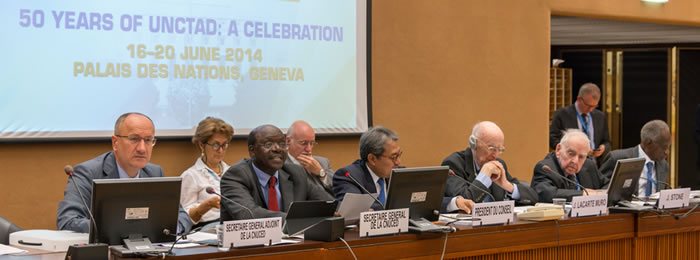UNCTAD Secretary-General Mukhisa Kituyi, together with high-level former UNCTAD officials, reflects on the past 50 years of the institution and the way forward.
UNCTAD began its fiftieth anniversary celebrations with a special event to take stock of how and where UNCTAD has made a difference and to look at its role in the current development landscape.
As UNCTAD Secretary-General Kituyi said in his opening statement, "the lessons of our past can help us face the challenge of our future".
These reflections set the stage for the presentation of a volume on the history of the UNCTAD produced for the fiftieth anniversary. Its author, Mr. John Toye, described the compromises that shaped UNCTAD's establishment and stressed the organization's galvanizing effects on the entire international community and how the creation of UNCTAD spurred other international economic and financial institutions, such as the World Bank and the International Monetary Fund, to adopt a broader and more development-oriented policy agenda.
Mr. Toye recalled that the founding father of the organization, Raúl Prebisch, had made efforts to set up a mechanism for supplementary financing and tariff preferences for the industrial exports of developing countries which culminated in the agreement to set up a generalized system of preferences. He praised the work of UNCTAD which preceded and followed the financial and economic crisis of 2007/08 and stressed the importance of defending its role in producing truly independent macroeconomic research and analyses.
Mr. Toye concluded that there could be no going back to the past, and that UNCTAD's future lay in supporting the integration of developing countries into the global economy, through the design of development policies within an intellectually coherent framework, and the identification of key gaps in global governance.
Three UNCTAD veterans praised the work of Mr. Toye, considering the volume to be a frank and direct assessment of the organization's history.
 From left to right: Mr. Petko Draganov (Deputy S-G UNCTAD), Mr. Mukhisa Kituyi (Secretary-General, UNCTAD), Mr. Triyono Wibowo (President of TDB), Mr. Julio Lacarte Muro (former Minister of Industry and Commerce, Uruguay), Mr. Jack Stone (former Head of UNCTAD Research Division) and Mr. Eugene Koffi Adoboli (former Prime Minister of Togo, former UNCTAD staff member) |
Mr. Julio Lacarte, former Minister of Industry and Commerce of Uruguay and a negotiator at the first session of the United Nations Conference on Trade and Development (UNCTAD I) in 1964, emphasized the importance of the United Nations Conference on Trade and Employment held in Havana, which represented the first opportunity for developing countries to rally together and demand an integrated treatment of trade and development. Unity among developing countries and cooperation were later also at the heart of the first session of the Conference, with the value of cooperation to address global and systemic issues becoming even more relevant today.
A veteran of UNCTAD II and former Head of UNCTAD's Research Division, Mr. Jack Stone discussed the role of UNCTAD in identifying the least developing countries and putting forward an integrated policy agenda in favour of these economies.
Finally, Mr. Eugene Koffi Adoboli, a former Prime Minister of Togo and former UNCTAD staff member, offered a detailed account of the group politics that had governed UNCTAD since its creation and in particular of the confrontation between the industrialized economies and the developing countries, a confrontation often dominated by the hardliners in each of the groups.
The second debate of the day continues with a round-table discussion on the challenges ahead.


